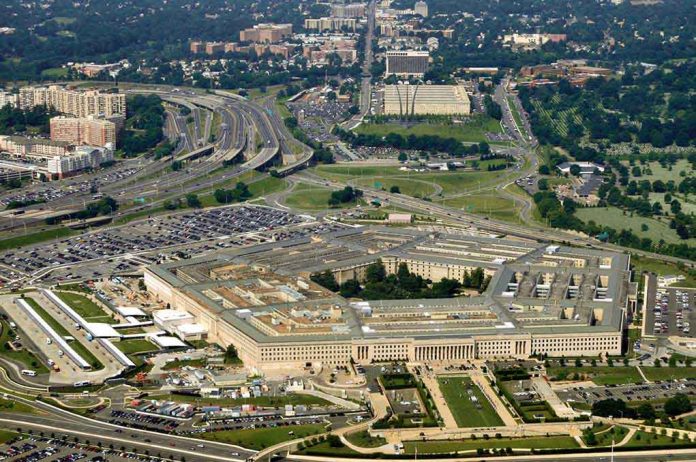
President Trump warns that U.S. military might “at levels never seen before” will descend on Iran if American forces face any attack, while simultaneously confirming Iran’s interest in negotiating an end to hostilities with Israel.
Key Takeaways
- The U.S. is deploying significant military assets to the Middle East, including the USS Nimitz Carrier Strike Group, four destroyers, and 30 air-refueling tankers despite claiming non-involvement in Israel’s strikes against Iran
- President Trump has denied U.S. involvement in recent Israeli attacks while offering to mediate peace negotiations, stating Iran “should talk immediately before it’s too late”
- Iran has reportedly reached out to Gulf states to mediate a ceasefire with Israel, expressing willingness to negotiate if the U.S. stays out of direct military engagement
- Israel has successfully targeted Iranian nuclear facilities and eliminated high-ranking officials, but key nuclear program components remain intact despite extensive strikes
- Regional stability requires developing collective security mechanisms among Middle Eastern nations, while the current military posturing raises concerns about another prolonged U.S. engagement in the region
America’s Military Footprint Expands Despite Claims of Non-Involvement
The U.S. military is substantially increasing its presence in the Middle East while maintaining an official distance from Israel’s strikes on Iran. The Pentagon has directed the USS Nimitz Carrier Strike Group, including four destroyers and a complete air squadron, to the region. Additionally, 30 U.S. Air Force air-refueling tankers have crossed the Atlantic, though military officials describe these movements as routine exercises or NATO-related training. The USS Thomas Hudner destroyer was also repositioned closer to Israel following its surprise attack on Iranian targets, with American forces assisting in intercepting missiles fired from Iran.
Secretary of State Marco Rubio has explicitly denied American involvement in Israel’s strike against Iran, directly contradicting Iranian claims that the U.S. coordinated with Israel on the attacks. This positioning comes as influential voices within President Trump’s support base, including Steve Bannon and Tucker Carlson, have vocally criticized any potential U.S. military involvement in the escalating conflict. The conflicting narratives between official U.S. statements and Iranian accusations create significant tension about America’s true role in the ongoing hostilities.
President Trump’s Diplomatic Balancing Act
President Trump has taken a complex position on the conflict, simultaneously offering to broker peace while warning of an overwhelming military response if U.S. forces face attack. The President has made his stance clear through forceful statements about potential American retaliation while acknowledging Iran’s interest in negotiations to end the conflict with Israel. This dual approach reflects the delicate balance between projecting military strength and creating diplomatic openings to prevent further escalation.
“The U.S. had nothing to do with the attack on Iran tonight. If we are attacked in any way, shape, or form by Iran, the full strength and might of the U.S. Armed Forces will come down on you at levels never seen before. However, we can easily get a deal done between Iran and Israel, and end this bloody conflict!!!” said Donald Trump
Trump has further expressed that Iran’s position in the conflict is weakening, stating they should pursue negotiations immediately. However, Israeli national security adviser Tzachi Hanegbi contradicted this assessment, indicating Israel is not ready for talks so soon after initiating military action. This disconnect between American and Israeli perspectives on negotiations creates significant complications for any potential diplomatic resolution, even as Iran reportedly expresses openness to ceasefire discussions if the United States remains militarily uninvolved.
Regional Dynamics and Historical Context
The Middle East faces increasing instability as military adventurism by both Israel and Iran threatens regional security. Israel’s far-right government has demonstrated its preference for warfare over negotiations, successfully targeting Iranian nuclear facilities and eliminating high-ranking officials. However, despite extensive strikes, Israel has not fully destroyed Iran’s nuclear program, which remains its primary strategic objective. This limited success raises questions about the effectiveness of military solutions versus diplomatic approaches to resolving longstanding tensions.
“Indeed, recent statements and positions from Gulf states, Egypt, Iraq, and Jordan show that the Arab world has opposed Israeli strikes on Iran,” stated Gulf states, Egypt, Iraq, and Jordan
The historical context of U.S.-Iran relations provides an important perspective on the current crisis. Iran’s nuclear program began with American support in 1957, but relations deteriorated dramatically following the 1979 Islamic Revolution. Some analyses suggest the overthrow of the Shah of Iran occurred with U.S. and British involvement, potentially motivated by oil interests. This complex history continues to influence contemporary tensions, as Iran seeks negotiations with the United States regarding its nuclear program while simultaneously working to improve relations with its Arab neighbors.
Path Forward: Diplomacy or Conflict
Long-term stability in the Middle East requires developing regional mechanisms for collective security and peaceful conflict resolution. While Israel currently holds significant military and intelligence advantages over Iran, the Iranian strategy of utilizing proxies across Lebanon, Iraq, Yemen, and Palestine has proven resilient despite recent setbacks. The U.S. military presence in the region adds another complex dimension to this volatile situation, raising concerns about another prolonged American engagement in Middle Eastern conflicts.
“I’d say Iran is not winning this war, and they should talk. And they should talk immediately before it’s too late,” said Donald Trump
Iran’s reported outreach to Gulf countries for ceasefire mediation suggests potential diplomatic openings that could be pursued. However, the Israeli position that “you don’t go to war and look to end it three days later” presents significant obstacles to immediate peace negotiations. As American military assets continue flowing into the region, the risk of broader conflict remains high despite diplomatic initiatives. The ultimate path forward will depend on whether regional powers and the United States prioritize negotiated solutions over continued military confrontation in this increasingly dangerous standoff.



